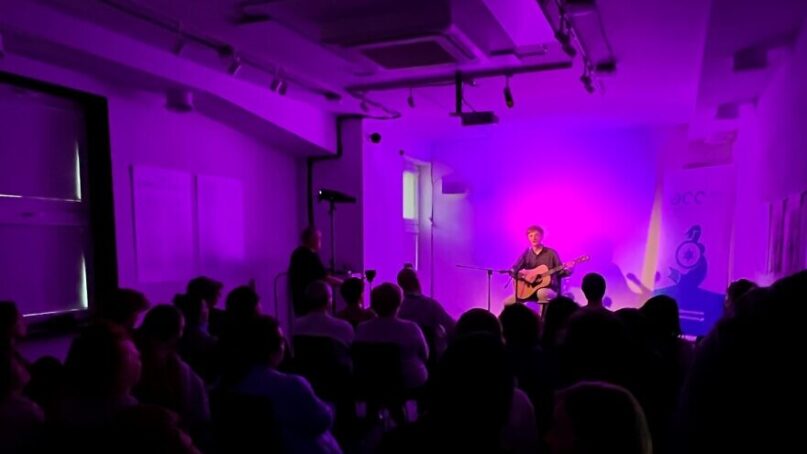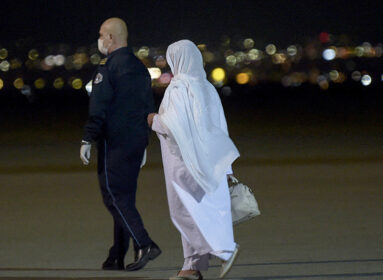
By Mike Wagenheim
(JNS) Yiddish music, weaving in and out of Ukrainian songs, was heard emanating from central Warsaw’s Jewish community center on Sunday.
Dr. Yuri Vedenyapin, a McGill University professor of Yiddish and a musician, was leading a pre-Yom Kippur concert for Ukrainian Jewish refugees. None of them, of course, imagined in February that this is where they would be gathered during the Days of Awe. Vedenyapin was determined to make it meaningful.
“I have never been much of a Ukrainian-language performer. But in recent months, because of all of these events, I really started listening to and playing Ukrainian folk songs, which I always knew were very beautiful. And then, after a while, I started noticing striking similarities with Yiddish songs. So, I decided to build this program to make it a kind of musical dialogue between these cultures,” Vedenyapin, who has been living with the refugees at a Warsaw hotel since his arrival last week, told JNS.
He said that he thought about whether he should include only optimistic, fun, joyous songs, but chose not to after speaking with the refugees themselves.
“Sad songs are also very appropriate,” he said. “Even songs that talk about loss and orphans and so on. Yiddish has plenty that speaks to people, and sad, tragic songs can paradoxically be a source of comfort if they’re good songs, if they’re beautiful and, of course, performed well. I’ll do my best.”
This seemed to reflect the general sentiment among the approximately 600 refugees being cared for by volunteers from the Jewish Federations of North America (JFNA), the American Jewish Joint Distribution Committee (JDC) and their partner organizations in Poland.
“The first several months of the war, we focused on saving refugees’ lives, providing temporary housing, food, medicine and schooling. Now that we have saved the refugees from death, we need to give them life, employment and long-term housing—and, most importantly, a sense of home and of people still caring about their lives and struggles,” Chief Rabbi of Poland Michael Schudrich told JNS. “I am deeply appreciative to JFNA for remembering us and for finding the right volunteers for the necessary situations. Our volunteers have made and will make a real difference in the lives of our refugees.”
JFNA sent a group of seven Russian-speaking volunteers from the U.S. and Canada, including Vedenyapin, to lead High Holidays activities for refugees of Jewish descent in Poland. All of the volunteers are former Soviet refugees who now serve their local communities as educators or clergy.
“When we were working with people at the very beginning of the war, picking them up from the Polish-Ukrainian border, every single person would declare that they want to go back and this is what’s going to happen. And the truth is, unfortunately, that we hear this less and less,” Karina Sokolowska, JDC’s Poland Country Director, told JNS.
Sokolowska said that the refugees are increasingly telling her that it will take generations to rebuild Ukraine. But, she said, this doesn’t represent a sense of despair.
“In many ways, the refugees are much stronger than we are, and they have a spirit which we sometimes don’t have enough of. We are crashing or breaking more than they do during the work that we’re doing with them,” she said.
She added that the most heartbreaking stories come from the elderly and a number of Holocaust survivors who have already had to flee for their lives once, and now fear their lives will end under unthinkable circumstances.
The High Holidays, of course, bring an extra level of emotion with them. Sokolowska said the refugees she works with expressed the importance of being motivated to remember the importance of the season and that life goes on.
“This is the life cycle, the religious calendar, the life cycle, and it’s universal. If you’re practicing something in Judaism, wherever you are in the world, it’s more or less the same,” said Sokolowska.
Holiday activities in Warsaw are organized by the Office of the Chief Rabbi of Poland in partnership with JDC, in Krakow by JCC Krakow and in Lodz by the Office of the Chief Rabbi of Poland. Special Rosh Hashanah meals, educational programming and a musical tashlich service were conducted in Warsaw, led by Vedenyapin. In Krakow, Russian-speaking Rabbi Ilana Baird and artist Marina Paz led a Rosh Hashanah meal and educational programming. Volunteers will also build a sukkah together with refugees and lead programming during the Sukkot holiday. In Lodz, educator Alexander Katz is leading High Holiday services and community meals.
“I see a very strong need for community and being together and sharing experiences. Just going around the circle and sharing their stories makes a difference for [the refugees],” said Sokolowska. “It’s not necessarily about the Jewish community in that sense. This is just human, that they just need to be with somebody who could understand their experience and the horrific things that the majority of them went through.”
Yulia, a mother of two, is working with Sokolowska. She started her conversion to Judaism in Odessa and recently completed it in Poland.
“She’s the only very observant person in our team. And she got her beit din [a rabbinical court procedure to oversee and verify conversion] right before Rosh Hashanah. It’s very obvious that for her, it’s important, and it helps her through her experience and makes her much stronger,” Sokolowska observed.
Vedenyapin noted that most of the refugees are not religiously observant and have very little experience celebrating Jewish holidays.
“But at the Rosh Hashanah dinner, I think the atmosphere was very festive. The concept of a New Year’s celebration may be something they associate with December 31. It was like a wonderful surprise that now, in late September, we can celebrate the beginning of a new year. I think everyone, regardless of how educated they are in Judaism, were happy to embrace this concept,” he said.
Vedenyapin, who is teaching the refugees Hebrew and English, in addition to music, stopped the conversation for a moment upon hearing a knock on his hotel room door. He later realized it was likely a young girl wanting to continue her guitar lesson, which was interrupted that morning. She is part of a large group of children that meet Vedenyapin for lessons in the hotel lobby.
“One girl was very sad yesterday, and I asked her what’s going on. She told me she misses her guinea pig, who had to stay in Ukraine, and now her family is thinking about moving to Israel,” Vedenyapin recounted, adding that the girl wants to go back to Ukraine.
“She says nobody will bother to arrange transportation out of Ukraine for her guinea pig, let alone take it to Israel,” he said.
Vedenyapin never imagined he would be in Warsaw helping refugees on Rosh Hashanah this year. The young girl he spoke of certainly didn’t imagine she’d be one of those refugees. But they and all the refugees and volunteers will continue to band together during the Days of Awe, a traditional Jewish mixture of the sweet and somber.
PHOTO: Ukrainian rabbi
Main Photo: Jewish Federations of North America volunteer Dr. Yuri Vedenyapin performs at a JDC-led holiday concert for Ukrainian refugees held Oct. 3, 2022 at the JCC Warsaw. Credit: Office of the Chief Rabbi of Poland.








 Southern New England Jewish Ledger
Southern New England Jewish Ledger










